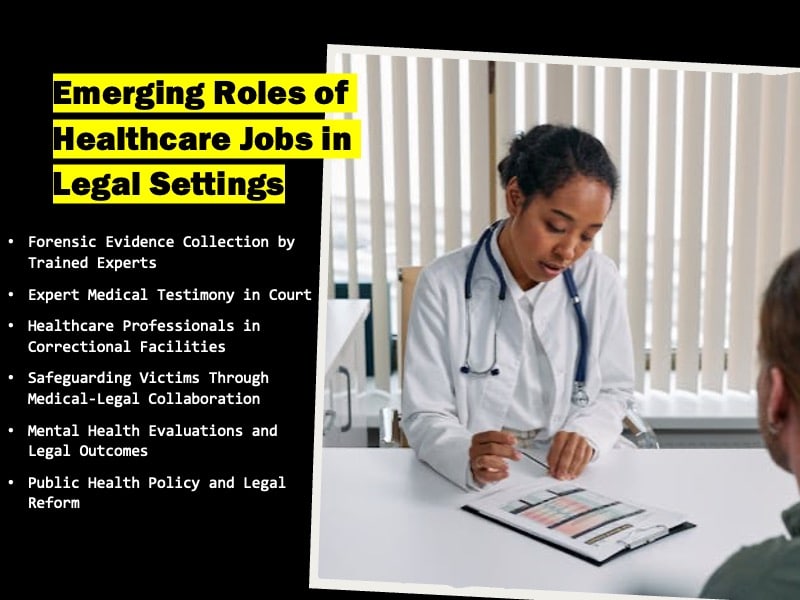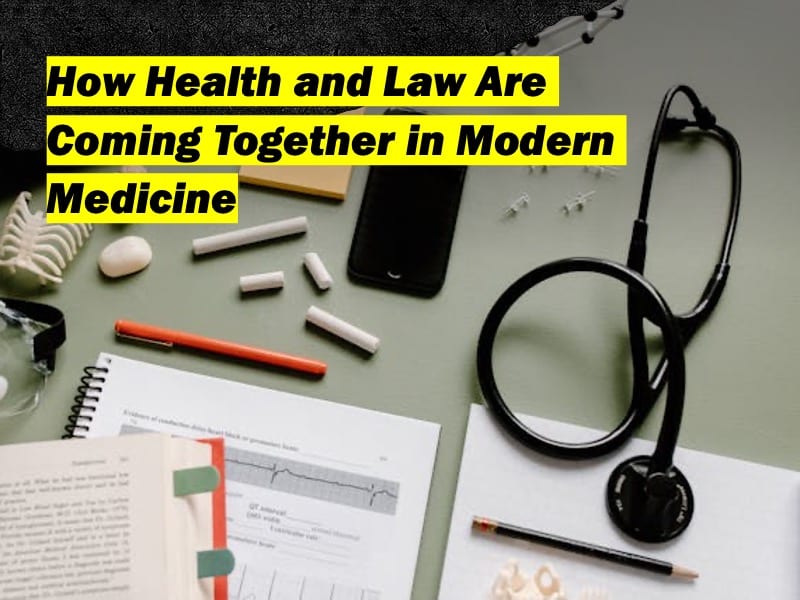How Health and Law Are Coming Together in Modern Medicine
Health and law may seem like two completely different worlds, but not anymore.
No longer confined to separate domains, healthcare professionals and legal experts are increasingly collaborating to address complex social challenges, ranging from medical ethics and forensic investigations to public health policy and patient rights.
As this collaboration deepens, it’s reshaping how care is delivered, how justice is served, and how communities are protected.
Through roles in forensic nursing, expert testimony, correctional healthcare, and mental health evaluation, professionals are stepping into dual-purpose positions that require both medical expertise and legal awareness.
With training programs and interdisciplinary initiatives on the rise, health and law are forming a united front that’s improving outcomes across society.
Emerging Roles of Healthcare Jobs in Legal Settings

Healthcare jobs are no longer limited to hospitals and clinics.
Today, trained professionals are becoming essential members of legal teams, law enforcement units, and courtroom proceedings.
From evaluating injuries to offering expert medical opinions, their insight is now deeply woven into the fabric of many legal processes.
This shift is more than just a trend, it’s opening new career pathways that blend medicine, law, and justice.
Professionals are increasingly involved in investigating trauma cases, documenting forensic evidence, and ensuring ethical standards in complex legal situations.
As a result, universities and medical institutions are creating interdisciplinary training programs that equip healthcare workers with both clinical and legal expertise.
Additionally, the collaboration between healthcare and the legal system often goes deeper than most people realize.
Medical professionals regularly partner with police departments, attorneys, and judicial systems to support victims, verify timelines, and clarify medical facts.
This type of work strengthens case outcomes and ensures vulnerable populations receive both justice and appropriate care.
One of the most compelling ways to understand this evolving field is by exploring famous nursing forensic cases.
These real-world examples illustrate how forensic nurses and other healthcare professionals utilize their medical expertise to support criminal investigations, testify in court, and advocate for survivors.
They are not just caregivers, they are agents of accountability, helping bring justice to those who need it most.
Forensic Evidence Collection by Trained Experts
In certain situations, collecting evidence isn’t just for police.
Healthcare professionals, especially those with the proper training, play a major role in gathering and documenting physical evidence.
This may include taking photos, collecting samples, or documenting injuries in a manner that is admissible in court.
One of the most powerful tools in this process is DNA collection, which has played a central role in some of the medical revolutions that changed history by exonerating the innocent and identifying perpetrators with scientific precision.
Proper evidence collection helps build stronger cases and protects both patients and legal teams.
It also ensures that sensitive situations are handled with care and professionalism, especially when victims are involved.
Expert Medical Testimony in Court
Sometimes, a courtroom needs more than just lawyers.
When legal teams deal with complex health details, they often rely on expert witnesses to explain things clearly.
That’s where healthcare professionals come in.
Their role is to break down medical terms, share informed opinions, and help judges or juries understand what really happened.
This kind of testimony can make or break a case, especially when someone’s well-being or safety is in question.
Healthcare Professionals in Correctional Facilities
Prisons and detention centers come with unique healthcare needs.
Medical staff working in these settings deal with everything from chronic illness to mental health challenges.
They also face daily legal and ethical challenges, such as ensuring proper care, documenting patient conditions, and protecting patient rights.
Their work helps ensure that health standards are upheld, even behind bars.
Safeguarding Victims Through Medical-Legal Collaboration
When it comes to helping victims of abuse, neglect, or assault, time and sensitivity matter.
Healthcare professionals often act as first responders in these cases. By working closely with social workers, law enforcement, and legal teams, they help ensure that individuals receive proper care and support, both physically and legally.
This type of collaboration helps protect vulnerable individuals while also gathering valuable information.
It’s not just about treatment; it’s about providing a full response that meets legal standards and helps victims feel seen, heard, and safe.
Mental Health Evaluations and Legal Outcomes
Mental health plays a big role in many legal decisions.
Psychiatrists, psychologists, and other qualified professionals often step in to assess whether someone is fit to stand trial, needs treatment, or can make informed decisions.
These evaluations carry significant weight in court.
Their input can affect sentencing, guardianship, or protective orders.
By offering professional insight, mental health experts help courts make more informed and fairer choices.
They also ensure that individuals with mental issues are not overlooked in the legal process.
Public Health Policy and Legal Reform
Public health doesn’t exist in a vacuum, it depends on good laws and strong policies.
Healthcare professionals often help shape those policies by sharing data, insights, and recommendations with lawmakers.
Whether it’s about drug regulations, safety rules, or access to care, their input is vital. By participating in task forces, writing reports, or giving expert advice, they help guide decisions that affect communities.
This kind of influence leads to better health outcomes, especially when professionals speak up about real challenges they see every day.
Training Programs That Prepare Professionals for Health and Law Roles
As health and legal fields overlap more, educational programs are stepping up to prepare people for these combined responsibilities.
Some universities now offer degrees or certifications in specialized areas, such as forensic nursing, legal medicine, or public health law.
Many of these courses are available online, making it easier for working professionals to build new skills.
These programs give students the knowledge to handle real-world situations where health meets law, opening the door to new roles and career growth.
Final Thoughts: How to Balance Roles as a Healthcare Worker with Legal Responsibilites
Navigating both clinical care and legal obligations requires healthcare professionals to make difficult decisions, such as when to report, when to maintain confidentiality, and how to balance respecting patient rights with following the law.
These decisions require good judgment, clear training, and a strong understanding of ethical guidelines.
When executed effectively, this dual responsibility safeguards individuals and develops trust in both healthcare and legal systems.
From courtroom testimony to forensic documentation, the growing intersection of health and law is solving complex challenges that neither field can tackle alone.
For medical professionals, this collaboration offers meaningful ways to make a broader impact.
For the public, it ensures better care, greater accountability, and access to justice.
As these roles continue to expand, they are reshaping what it means to serve and lead in modern medicine.
This website does not provide medical advice. This website site does contain affiliate links, and purchases may earn a commission.
Read my Medical Disclaimer, Review Disclaimer, and Publishing Policies for more details. Use of this site indicates acceptance of these terms.



